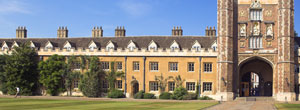England’s most prestigious educational facilities, including Cambridge and Oxford, are loyal to their traditions and one of these traditions includes entrance interviews as part of their admittance process. But it doesn’t have to be overwhelming if you consider it an opportunity to shine.

You’ve carefully considered your course load, determined your major and have chosen your school. Now, you must impress the interview committee and convince them you’re the ideal candidate for that one available slot that’s being fiercely sought by many.
Below are some things to consider for the entrance interview:
How will you use your education?
This might sound broad with several potential answers and avenues to carry those answers, but it’s broad for a reason: the interviewer wants to allow plenty of room, so to speak, for you to run with. Consider this: “It’s my goal to use my degree as the tool it’s designed for; I want to pursue my dreams of being the best accountant, physician, forensics scientist I can. My education is the vehicle to this success.”
Why this educational facility?
 This might be one of those questions that’s asked to ensure you don’t provide the wrong answer. The words that should never cross your lips are: Because this was the only one that accepted me. Instead, try this: “This school has a renowned accounting, medical, forensics program. This is where I know I can gain the best skill sets and knowledge.”
This might be one of those questions that’s asked to ensure you don’t provide the wrong answer. The words that should never cross your lips are: Because this was the only one that accepted me. Instead, try this: “This school has a renowned accounting, medical, forensics program. This is where I know I can gain the best skill sets and knowledge.”
Where do you see yourself in ten years?
This is another broad question that’s asked in many interviews, whether they’re job interviews or acceptance interviews for colleges. You can be sure this question, in this context, is another way the interviewer wants to ensure himself that giving you that spot in the program is the right thing to do. You might consider: “In ten years, my goal is to have made a significant contribution to the accounting, medical, forensics field. I want to remain current with all of the advances and am fully prepared to re-enter the educational arena for continuing education courses – whether it’s ten years or twenty years from now. My motivation is simple: I want to make a difference in this world with the one thing I’m truly passionate about.”
Although you can’t predict which questions you’ll be asked, you can take a step back and look at the process in its entirety. It’s important to approach the interview process with the right intentions, a sincere desire to show your true self and a determination to not sugarcoat your answers in an effort to simply impress the committee with your clever wit. It’s going to require nothing less than your absolute best.


